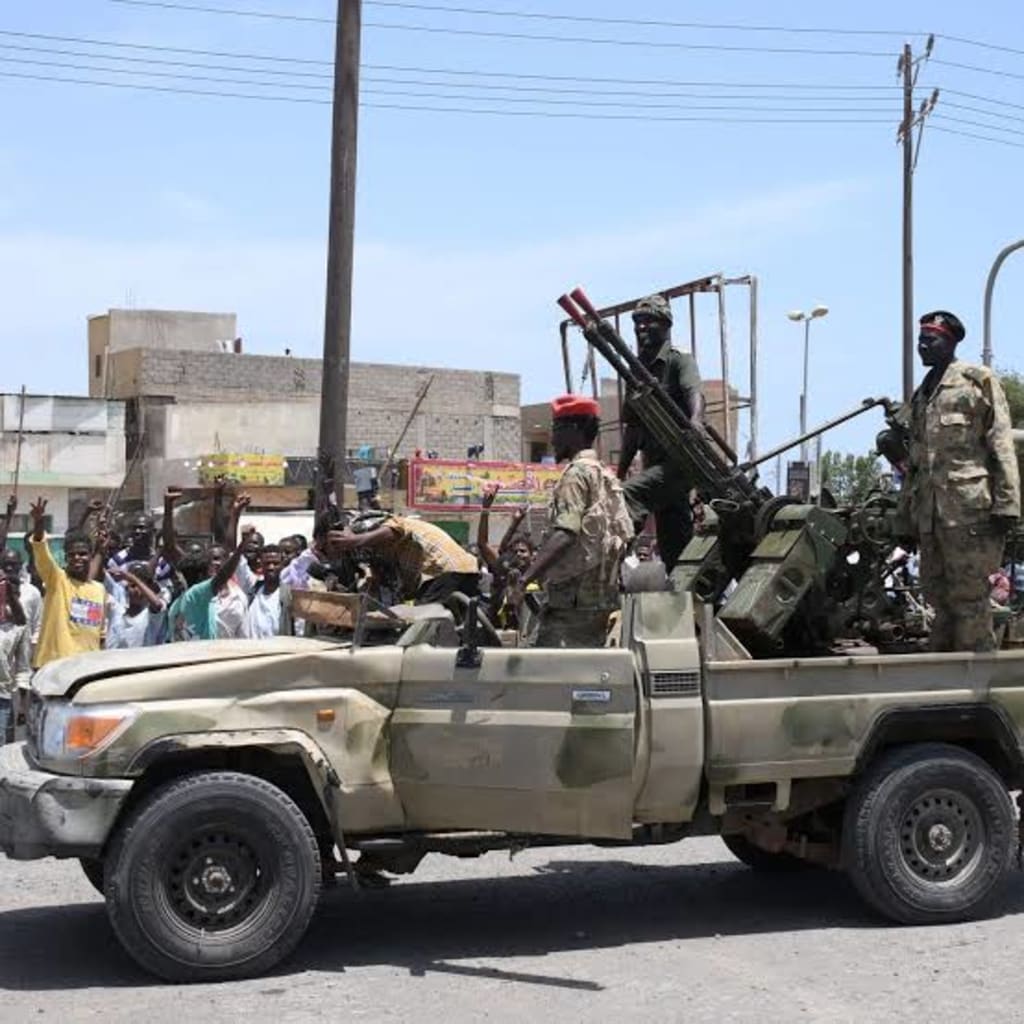
Is this perhaps another event in Africa’s playbook? The continent after all is known to be an active zone for political turmoil. I put it this way because I am an African, and I am not sure whether being euphemistic about our many dire situations is any quick road to opening our eyes to the realities on the ground, I don’t see euphemism helping in fostering any solution as well.
In 2021, there were four successful military takeovers in Africa. In 2022, there were similar coups. A study showed that between 1950 and 2022, there were about 486 coups from all the continents in the world. 214 happened on the African continent, although only 106 attempts were successful.
Out of all the African countries, Sudan has seen the most coup d’état, and currently, it is going through another political crisis. In this piece, I will try to explore the reasons behind the crisis in Sudan, and also offer potential solutions. If I am able to digress enough, I will try to explain some early signs of a military coup.
I’ll try to keep this short. I hope you have a wonderful time on this page.
Sudan In A Nutshell
Sudan is the third largest country in Africa. It is about 1.8m kmq. Nigeria is only about 923k kmq. Sudan is located at the heart of the African continent, and it is home to about 48m people.
During the first half of the 201st century, it was jointly ruled by Egypt and Britain, before ultimately being ruled solely by Britain. In political science, this is what we call a condominium. It is basically an unnecessarily long word that was used during the colonial era to describe a situation where a country is being ruled by more than one country.
It was administered as a British colony, although in 1956, it gained independence
- its post-independence experience has been marked by multiple military coups. As a matter of fact, it has had more military leaders than it has had civilian leaders. Between 1956 and 2022, Sudan reportedly had about 12 coup d’états, which is the highest in Africa. Nigeria has only had about 8 coups. This was between 1960 (when it gained independence) and 1999.
Because of the reoccurring military turmoil in the country, the country in 2011 ended up splitting into two - North and South Sudan. South Sudan became the youngest country in the world. From a political look, it is fair to say that religion, economics, and ethnicity divided the country since the Muslims and the Christians were actively at each other's throats. North Sudan is populated by an African Muslim Arab majority, while the south is more Christian and traditional believers. The regional conflicts escalated under the military president of Al-Basir.
In 1989, Omar Al-Basir seized power in a military coup, and he held on to it for over 30 years. His coup toppled a civilian-led regime, and after he gained his position in 1989, he abolished the position of prime minister, which left his power unchecked.
In 2019, he was overthrown by his Inspector general and his aide, two months after they were promoted. Basir was sceptical about his chances of retaining his power forever, since it was clear to him that if he could topple one government through force, his own government is certainly not immune to it too. Especially given that military juntas were basically a culture in Sudan at that point. He never fully trusted his Inspector General, General Abdel Fattah Al Burhan, let's just call him Burnham since he reminds me of Bo Burnham. It also helps me remember.
So, because Basir didn't trust his general, and he believed that it might be a little more difficult to overthrow him if there is someone else almost as powerful as Burnham. He, therefore, began relying on another guy - General Mohamed Hamdan Dagalo, whom we shall be calling Dagalo for simplicity's sake. Basir (our military president) promoted Dagalo up to the point where he was just a rank below Burnham. Basir failed to take into account that Dagalo and Burnham both served in the Yemen war, and this gave them an opportunity to become friends. And only two months after they were both promoted, they turned on Basir and overthrew him in the same 2019.
This is almost like the situation that played out in the 1917 Russian revolution, and also the 1927 Chinese civil war. You give a gun to a bear because a monkey is chasing you with a stick.
But anyway, this is where our story of the current political turmoil in Sudan starts.
The Trouble Intensifies
In 2019 when Burnham became the military president, he began solidifying ties with other countries like the US, Egypt, and Israel. In that same year, he set up a council that is intended to assure a successful transition back to a civilian government, he made himself the chairman of the council, and the council is called Transitional Sovereignty Council. Naturally, he made Dagalo the vice-chairman.
The TSC consisted of both civil political groups, and military groups. Although this all changed in 2021 when military leaders removed the civilian bodies from the TSC in a coup d’état. Previously in 2019, the military and civilian leaders had made a deal that the military would dissolve the TSC and hand over power to the people in 3 years and 3 months. Basically, the military will rule for 21 months, and the civilian leaders will also lead for 18 months. Since this council was set up to ensure a successful transition to civilian rule, one would expect that such would be the case. Well. Let's just say that the military leaders waited patiently till 2021, and they chose to remove civilians totally from the governance of Sudan.
The military detained several civilian leaders, members of political parties, lawyers, journalists, ministers, activists, etc... The entire 2021 coup d’état was a plot to remove total civilian participation from governmental roles.
Once the TSC was dissolved, it was now a matter of who gets to rule between Generals Al-Burhan and Hamdan Dagalo. It is important to know that Burnham is the military leader of the Sudanese Armed Forces (SAF), while Dangalo is the head of the Rapid Support Force (RSF) para-military group. In their clash for the ultimate leader, both of them began acting like politicians in order to secure favours from the people of Sudan.
Dagalo is actively trying to push the agenda that he is on the side of the people, and Al Burhan is the one that must be removed from power. Dagalo became more vocal about his position following the appointment of people affiliated with the Basir regime that they both toppled.
The people Burhan is appointing don’t trust Dagalo since he colluded with Burhan to overthrow Basir back in 2019. So, as it is, the current situation in Sudan is as messy as it gets. There have been clashes between the SAF and RSF. This escalated the event in 2023 which has led up to the point where foreign countries are moving their nationals out of Sudan.
The Aftermath
The situation keeps getting worse as both sides of the military forces face off. Leaving the country torn apart. Neither of them is willing to give up their power, and neither seems to wish to work with the other. A type of situation where the enemy of my enemy is my friend, but now that my enemy is no longer a concern, that makes you the enemy.
Dagalo is busy investing in gold mines and businesses across the country, while Burhan is busy securing political allies all over the country.
Even right now, Burhan has publicly announced the RSF as a rebel force that must be disbanded, and naturally, the RSF (considering themselves the proper government) has equally made similar claims about the status of the SAF.
Right now, it doesn’t seem too obvious how the war between these two de-facto leaders will end, but what is clear is that Sudan, which is the battleground, has suffered greatly. The people of Sudan have been through much since they gained their independence.
One can only hope for a peaceful resolution to the conflict that is plaguing them. I am a gen-z, and I haven’t witnessed a war, but being a student of Political Science has opened my eyes to some of the horrors of war. Therefore, I hope that all the displaced people of Sudan find a home, and the war is brought to a peaceful resolution.
Thank you for reading. I hope to see you again next week. Cheers!
About the Creator
BigPhaze
I am a Social Scientist, specifically a student of Political Science. I attend Obafemi Awolowo University, Nigeria. Writing is a tool of exploration for me. I hope you'll stick around for my journey into uncharted territories.






Comments
There are no comments for this story
Be the first to respond and start the conversation.